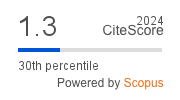Potential immunomodulatory activity of Phyllanthus niruri aqueous extract on macrophage infected with Streptococcus sanguinis
Downloads
Background: Streptococcus sanguinis is an oral commensal bacterium commonly found in periodontal lesions and deep abscesses that are usually dominated by anaerobic bacteria. As an important causative agent of systemic diseases, and with the increasingly numerous cases of antimicrobial resistance, some means of modulating the immune response to bacterial infection is thus necessary. Phyllanthus niruri Linn is widely used as a medicinal herb to both prevent and treat disease and demonstrates immunomodulatory properties. Purpose: This study aimed to observe the potential for aqueous extract of Phylanthus niruri to induce macrophage proliferation and NO production following S. sanguinis infection. Methods: Macrophages were isolated from the peripheral blood of healthy subjects, stimulated with P. niruri aqueous extract in graded doses and infected with S. sanguinis ATCC 10556 bacterial suspension. Cell proliferation and nitric oxide release was observed at 24 and 48 hours to determine macrophage activities. Results: NO production and cell proliferation started to increase upon 50 and 100µg/ml P niruri respective stimulation. Statistical analysis using One-way Anova demonstrated a significant difference of cell proliferation after stimulation with P. niruri aqueous extract at various doses (p<0.05). Conclusion: P. niruri aqueous extract induced macrophage proliferation and NO secretion upon S sanguinis infection, showing potential antibacterial and immunomodulatory activities. At the same concentrations, NO production and macrophage were higher at 48 hours than at 24 hours.
Downloads
Ge X, Kitten T, Chen Z, Lee SP, Munro CL, Xu P. Identification of Streptococcus sanguinis genes required for biofilm formation and examination of their role in endocarditis virulence. Infect Immun. 2008; 76(6): 2551–9.
Lockhart PB, Brennan MT, Sasser HC, Fox PC, Paster BJ, Bahrani-Mougeot FK. Bacteremia associated with toothbrushing and dental extraction. Circulation. 2008; 117(24): 3118–25.
Westling K. Viridans group Streptococci septicaemia and endocarditis. Thesis. Stockholm: Karolinska Institutet; 2005. p. 9-31.
Bah A, Vergne I. Macrophage autophagy and bacterial infections. Front Immunol. 2017; 8: 1–9.
Vazquez"Torres A, Stevanin T, Jones"Carson J, Castor M, Read RC, Fang FC. Analysis of nitric oxide"dependent antimicrobial actions in macrophages and mice. Methods Enzymol. 2008; 437: 521–38.
Abbas AK, Lichtman AH. Basic immunology : functions and disorders of the immune system. 3rd ed. Philadelphia: Saunders; 2011. p. 312.
Masuda K, Nemoto H, Nakano K, Naka S, Nomura R, Ooshima T. Amoxicillin-resistant oral streptococci identified in dental plaque specimens from healthy Japanese adults. J Cardiol. 2012; 59(3): 285–90.
Sahasrabhojane P, Galloway-Peña J, Velazquez L, Saldaña M, Horstmann N, Tarrand J, Shelburne SA. Species-level assessment of the molecular basis of fluoroquinolone resistance among viridans group streptococci causing bacteraemia in cancer patients. Int J Antimicrob Agents. 2014; 43(6): 558–62.
Amin ZA, Abdulla MA, Ali HM, Alshawsh MA, Qadir SW. Assessment of In vitro antioxidant, antibacterial and immune activation potentials of aqueous and ethanol extracts of Phyllanthus niruri. J Sci Food Agric. 2012; 92(9): 1874–7.
Ibrahim D, Hong LS, Kuppan N. Antimicrobial activity of crude methanolic extract from Phyllanthus niruri. Nat Prod Commun. 2013; 8(4): 493–6.
Liu S, Wei W, Shi K, Cao X, Zhou M, Liu Z. In vitro and in vivo anti-hepatitis B virus activities of the lignan niranthin isolated from Phyllanthus niruri L. J Ethnopharmacol. 2014; 155(2): 1061–7.
Ibnul A. Uji komparasi aktivitas fagositosis makrofag dan produksi nitrit oksida pada mencit Balb/c akibat perlakuan ekstrak meniran hijau (Phyllanthus niruri) dan meniran merah (Phyllanthus urinaria) yang diinfeksi bakteri Salmonella typhi. Thesis. Surakarta: Universitas Sebelas Maret; 2012.
Putri DU, Rintiswati N, Soesatyo MH, Haryana SM. Immune modulation properties of herbal plant leaves: Phyllanthus niruri aqueous extract on immune cells of tuberculosis patient - in vitro study. Nat Prod Res. 2018; 32(4): 463–7.
Hutomo S, Susilowati H, Agustina D, Asmara W. Analysis of anti-Streptococcus sanguinis IgY ability to inhibit Streptococcus sanguinis adherence. Dent J (Maj Ked Gigi). 2018; 51: 33–6.
Green LC, Wagner DA, Glogowski J, Skipper PL, Wishnok JS, Tannenbaum SR. Analysis of nitrate, nitrite, and [15N]nitrate in biological fluids. Anal Biochem. 1982; 126: 131–8.
Weiss G, Schaible UE. Macrophage defense mechanisms against intracellular bacteria. Immunol Rev. 2015; 264(1): 182–203.
Myers JT, Tsang AW, Swanson JA. Localized reactive oxygen and nitrogen intermediates inhibit escape of Listeria monocytogenes from vacuoles in activated macrophages. J Immunol. 2003; 171(10): 5447–53.
Eze CO, Nworu CS, Esimone CO, Okore VC. Immunomodulatory activities of methanol extract of the whole aerial part of Phyllantus niruri L. J Pharmacogn Phyther. 2014; 6(4): 41–6.
Nworu CS, Akah PA, Okoye FBC, Esimone CO. Aqueous extract of Phyllanthus niruri (Euphorbiaceae) enhances the phenotypic and functional maturation of bone marrow-derived dendritic cells and their antigen-presentation function. Immunopharmacol Immunotoxicol. 2010; 32(3): 393–401.
Copyright (c) 2018 Dental Journal (Majalah Kedokteran Gigi)

This work is licensed under a Creative Commons Attribution-ShareAlike 4.0 International License.
- Every manuscript submitted to must observe the policy and terms set by the Dental Journal (Majalah Kedokteran Gigi).
- Publication rights to manuscript content published by the Dental Journal (Majalah Kedokteran Gigi) is owned by the journal with the consent and approval of the author(s) concerned.
- Full texts of electronically published manuscripts can be accessed free of charge and used according to the license shown below.
- The Dental Journal (Majalah Kedokteran Gigi) is licensed under a Creative Commons Attribution-ShareAlike 4.0 International License

















